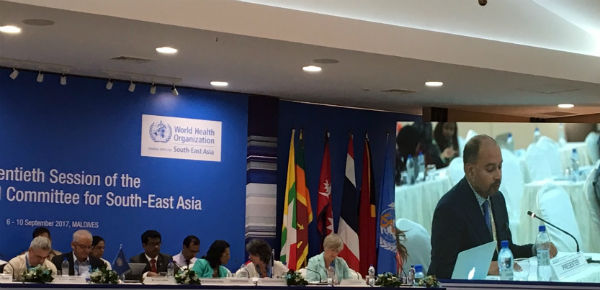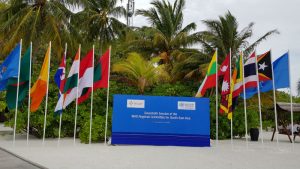Knowledge Ecology International (KEI) delivered the following statement during discussions at the WHO South East Asia Region (SEARO) Regional Committee on Access to Medicines on 9 September 2017 in the Maldives.
(Photo taken by Cristina Bajar)

Intervention of Knowledge Ecology InternationalSeventieth Session of the Regional Committee – SEARO: 8.3 Access to medicines – SEA/RC70/9
Saturday, 9 September 2017Honorable ministers, Dr. Poonam Singh,
Thank you for providing Knowledge Ecology International the opportunity to comment on the SEARO document on Access to Medicines.
The SEARO paper highlights the need for an expanded role for transparency, recommending that the WHO “foster inter-country and regional cooperation in procurement, pricing and regulation of medical products.”
To this end, we ask members states to support a resolution – at the global level – on transparency that would provide the WHO with the authority to explore norms and mechanisms to enhance the transparency of R&D costs, prices and revenues. At the regional level, we suggest further consideration of strategic actions to improve transparency.
While we acknowledge the importance of public and private sector funding of research and development of pharmaceuticals, vaccines and other health technologies, there is a paucity of data on investment flows and the costs for research and development for specific products.
We note with concern the limited public access to data from some clinical trials, including trials that fail, which reduces access to knowledge critical for advances in science, and hinders the appropriate scrutiny of trial design and the accuracy of reporting of such results. This has direct and negative consequences for our knowledge about the safety and efficacy of medicines prescribed to patients.
Policies that influence the pricing of health technologies or the appropriate rewards for successful research outcomes can be better evaluated when there is reliable, transparent and sufficiently detailed data on the costs of R&D inputs (including information of the role of public funding and subsidies), the medical benefits and added therapeutic value of products. The actual access or lack of access to products by patients is highly dependent on affordable prices. In conclusion, as has been reaffirmed by SEARO, access to medicines is the bedrock of universal health coverage.
